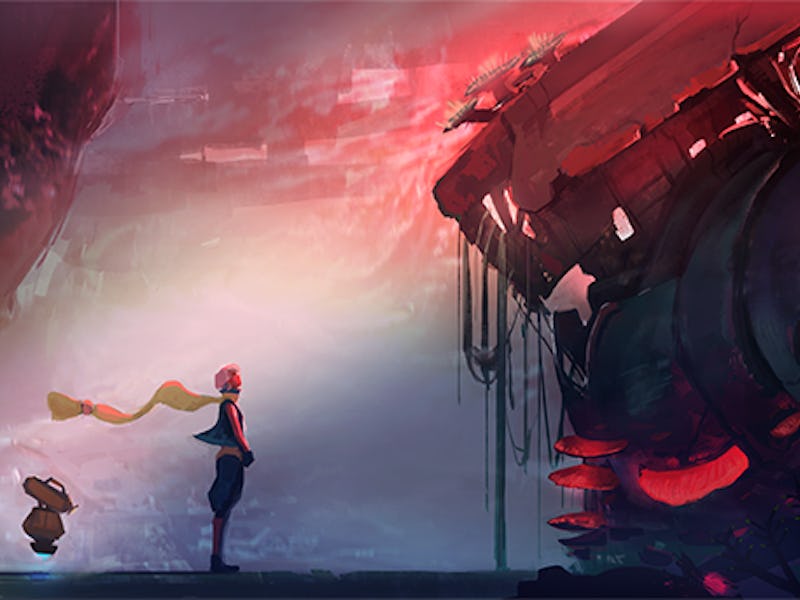'Failsafe' Parkours Into a World of Secrets
And better representation in games.

I’m in the unfinished loft above an arts district warehouse in downtown Los Angeles. The third band of the night has just left the stage, and our M.C. is screaming at a volume somehow still not as loud as his pants.
“We’re looking for funding. We want your funding. I’ll do anything. You should check out the ten thousand hundred thousands level. I’ll do anything for that. I’m very good at body rolls.”
The audience shouts and agrees, even before seeing proof of the body rolls. What is inspiring such fervent devotion?
“We’re tired,” the MC shouts. “We’re tired of seeing the same old thing over and over. I don’t want to play any more games about a white dude with a five o’clock shadow. This is about hearing a new story; a story we’ve never heard before. This is for the rest of us.”
The room explodes into applause. The MC re-thinks this, then leans into the camera that is live-streaming the event.
“But, like, if you’re a white dude with a five o’clock shadow,” he says with the sudden composure of a stock broker, “like, these tight parkour game mechanics will still give you a boner. This is for you too.”
The room erupts in agreement, a second time.
We’re gathered here to bring attention to the Kickstarter for the Game Over debut game Failsafe — a first person parkour adventure game featuring a female protagonist and a gigantic world filled with secrets. With only two weeks to go in the fundraising campaign, only $20k of the needed $80k has been secured, and that’s a goddamned shame.
I sneak out of the party to interview Daniel Lisi, the company’s managing director. After some gentle ribbing I give him about the business success of the industry’s only other first-person female protagonist parkour game Mirror’s Edge, we get down to the brass tacks of what separates Failsafe from the rest of the gaming pack, and why consumers should take a nearly one-hundred grand gamble on Game Over’s first outing.
We start with a discussion of the team, featuring an animator from Journey, an environmental artist from Shadows of the Damned and Metal Gear Solid 4, the writer of Borderlands 2, a Tony-award winning poet, an incredibly deep line of programmers, and even Rufio from the movie Hook. Yes, Dante Basco voices the side-kick character. This point is especially delightful for me. This is L.A.’s Game Over company.
Last year, they got together and pitched different ideas for telling a sprawling, beautiful story in a world unlike anything gamers have ever seen. What came out of those meetings was the world of Failsafe:
In a small, remote village, on a wasteland of a planet, lives a young girl named Isra. Raised to one day lead her people, she longs instead to follow her uncle’s path and explore the world beyond the safety of their village. As another cycle ends, she convinces him to bring her along on his journey. He has agreed to take Isra to the place where he must travel every cycle in order for their people to survive: The Forgotten.
All of this takes place in an adventure game inspired by Hayao Miyazaki’s storytelling, reminiscent of the fluidity of Journey and the monolithic scale of Shadow of the Colossus. The parkour mechanics actually fell into place later in a game that once felt like more of a spiritual sequel to Brothers: A Tale of Two Sons, but morphed into a complicated system of rhythmic body controls.
Circling back to my original comparison, I ask Lisi what separates Failsafe from the only other members of this genre: Mirror’s Edge, and to a much lesser degree, Brink. I’m shown. Faith from Mirror’s Edge would spring off predetermined platforms and pressing a key activated an animation, just as pressing a key activated an animation to send her up a ladder. This new game treats all surfaces as conquerable and invites you to control the main character throughout every trial, while adding in a grappling hook that makes the entire world traversable. Which is required for finding all of the hidden secrets placed where you’d least expect them, including some award-winning original poetry.
Which gets back to our primary protagonist Isra, the young girl who has yet to find her place in this world. Voiced by Ashly Burch (Life Is Strange), once the adventure begins she finds herself paired up with a robot named XJ who has always been online but has never felt connected. Daniel teased the notion that both characters come from opposing worlds, and that they’ll both need to overcome their inherent prejudices as part of the gameplay as they learn to work together, which is a concept I cannot wait to see in action.
The Kickstarter is live now and can really use your help. Time is running out on this spiraling world with a complex design and an innovative gameplay mechanic to boot.